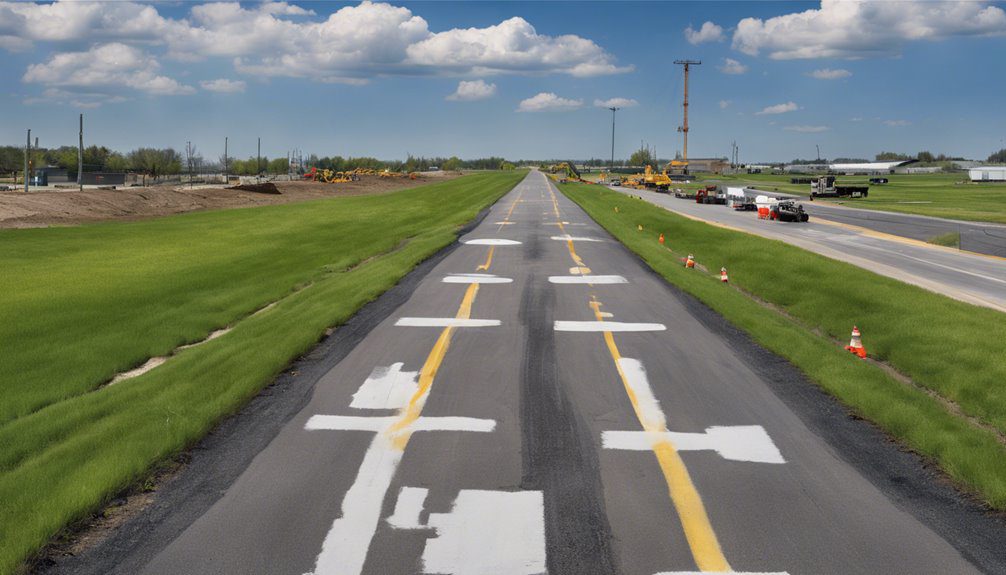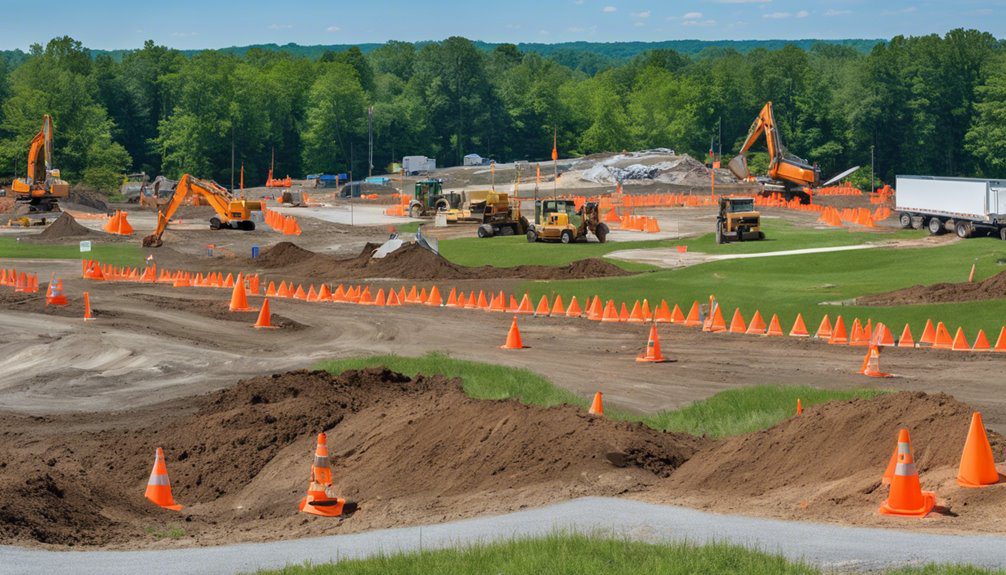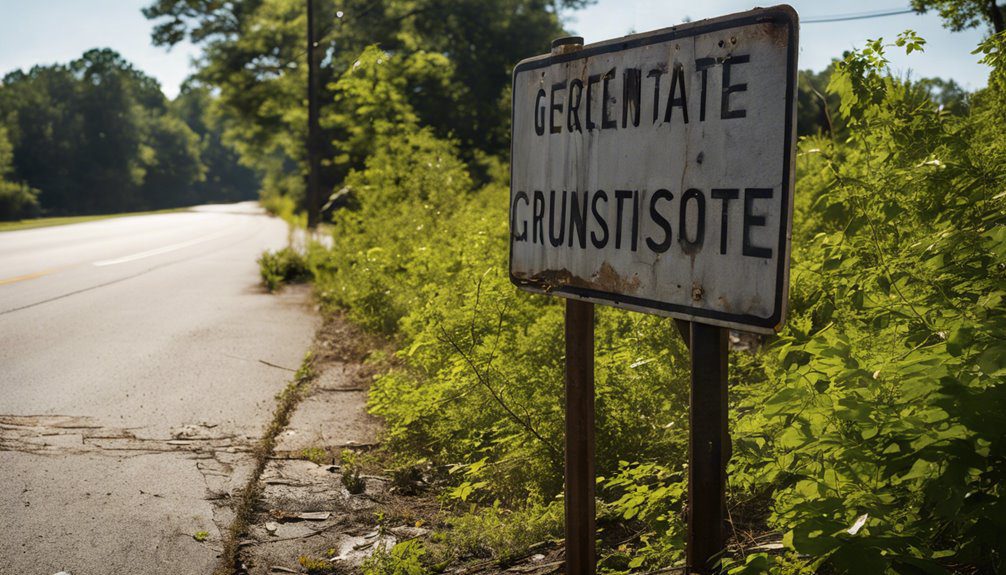When you're navigating public infrastructure projects in Greenville County, understanding the Right of Way Bond is crucial. This bond isn't just a formality; it acts as a financial safety net for both the county and the public. You'll need to grasp its significance, the regulations governing it, and the specific requirements for developers. But what happens when challenges arise in securing this bond? The implications can be far-reaching, and knowing how to address them is key to successful project execution. Let's explore the factors that shape this critical aspect of development.
What Is a Right of Way Bond?

A right of way bond is a financial guarantee that ensures a contractor or developer will complete the necessary work within a designated public space, like sidewalks or roadways. This bond protects the public's interest by holding the contractor accountable for their commitments.
When you hire a contractor for a project that involves public infrastructure, you want to ensure they'll follow through and adhere to local regulations. By obtaining a right of way bond, the contractor provides assurance that they'll complete the project according to the agreed-upon specifications.
This bond typically covers the costs related to any necessary repairs, maintenance, or restoration of the public space after the work is done. If the contractor fails to meet their obligations, the bond can be used to cover the expenses incurred to correct any issues.
In essence, a right of way bond serves as a safety net for local authorities and the community. It encourages responsible behavior and encourages contractors to maintain high standards in their work.
Importance of Right of Way Bonds
Right of way bonds play a crucial role in ensuring the integrity of public infrastructure projects. When you're involved in such projects, these bonds act as a financial guarantee, assuring that you'll adhere to local regulations and complete the work as promised.
Without this bond, you risk delays and potential legal issues, which can be costly for everyone involved.
By securing a right of way bond, you demonstrate your commitment to maintaining the project's quality and safety standards. This not only builds trust with local authorities but also with the community that relies on these infrastructure improvements.
If you fail to meet your obligations, the bond provides a safety net, allowing funds to be accessed to rectify any problems, thereby minimizing disruptions.
Additionally, right of way bonds can enhance your reputation as a responsible contractor. When clients see that you prioritize compliance and quality, they're more likely to choose you for future projects.
In essence, these bonds are more than just paperwork; they're vital tools that protect your interests and contribute to the successful execution of public infrastructure initiatives. Furthermore, understanding the regulatory framework governing these bonds is essential for ensuring compliance and avoiding potential penalties.
Greenville County Regulations

Navigating Greenville County's regulations for right of way bonds is essential for any contractor involved in public infrastructure projects. These regulations are designed to ensure that all work within public rights of way is performed safely and efficiently while protecting community interests.
First, you'll need to familiarize yourself with the specific requirements set forth by the county's planning and engineering departments.
Before you start your project, you should obtain the necessary permits. This often includes submitting an application detailing your proposed work, along with any required documentation. Make sure to provide accurate project timelines and clear designs, as this will help expedite the approval process.
Additionally, it's crucial to understand the bond amount required, as this may vary depending on the scope of your project. It is also important to recognize that surety bonds help protect the interests of the obligee in case of non-compliance.
You'll also need to keep up with any local ordinances or updates that may impact your work.
Lastly, maintain open communication with county officials throughout your project. This proactive approach can help you address any issues that arise and ensure compliance with Greenville County's regulations.
Types of Right of Way Bonds
Various types of right of way bonds are available to meet the needs of different infrastructure projects in Greenville County. The most common types include performance bonds, maintenance bonds, and payment bonds.
Performance bonds ensure that you complete the project according to the specifications and regulations set forth by the county. If you fail to meet these obligations, the bond can be drawn upon to cover the costs incurred in completing the work.
Maintenance bonds serve as a guarantee that you'll maintain the infrastructure for a specified period after completion. If any issues arise during this time, the bond can be used to pay for repairs or maintenance.
Payment bonds protect suppliers and subcontractors by ensuring they get paid for their work and materials. If you don't meet your payment obligations, the bond can cover the unpaid amounts, safeguarding those who contribute to your project.
Choosing the right type of bond is crucial for your project's success. It not only helps you comply with local regulations but also provides financial protection for everyone involved. Additionally, understanding the performance bond process can make the application smoother and more efficient.
Understanding these options can make the process smoother and more efficient.
Process to Obtain a Bond

To obtain a right of way bond in Greenville County, you'll need to follow a series of steps that ensure compliance with local regulations.
First, gather all necessary documentation, including your project plans and any required permits. It's crucial to understand the specific requirements for your bond, as these can vary based on the project type.
Next, reach out to a surety company or bonding agent. They'll guide you through the application process and help you understand what information they need. Be prepared to provide details about your financial history and the scope of your project, as this information will influence the bond's approval.
Once you've submitted your application, the surety company will assess your qualifications. Depending on their evaluation, you may need to pay a premium or provide collateral to secure the bond. This process of assessment is important as surety companies assume risk associated with business operations when providing bonds.
After finalizing these arrangements, you'll receive your bond, which you must then submit to the appropriate local authority.
Costs Associated With Bonds
When securing a right of way bond in Greenville County, it's important to consider the costs involved. The primary expense you'll face is the premium you'll pay to the bonding company. This premium typically ranges from 1% to 3% of the total bond amount, depending on factors like your credit score and the project's scope.
It's wise to shop around for the best rates, as different surety companies may offer varying premiums.
In addition to the premium, you may encounter other fees, such as underwriting fees or administrative charges, which can add to your overall costs. Be sure to clarify these potential expenses upfront when you approach a bonding company.
Don't forget that the bond amount itself is a financial commitment. You'll need to ensure you have the necessary funds available to cover it, along with any potential increases due to project changes. Furthermore, understanding the Texas Surety Bonds can provide you with valuable insights into the specific requirements and costs associated with different types of bonds.
Lastly, consider the time you may spend on obtaining the bond; while it's not a direct cost, it can affect your project timeline and budget. By understanding these costs, you can better prepare for securing your right of way bond in Greenville County.
Bond Requirements for Developers

What do developers need to know about bond requirements in Greenville County?
First off, you'll need to secure a right-of-way bond before starting any construction projects that involve public infrastructure. This bond acts as a financial guarantee that you'll adhere to local regulations and complete required improvements.
The amount of the bond typically depends on the project size and scope, so be prepared to provide detailed estimates of your project costs.
You'll also need to submit a bond application to the local government, which includes all necessary documentation regarding your planned work.
It's crucial to work with a licensed bonding company that understands the specific requirements in Greenville County. They can help you navigate the application process and ensure that your bond meets all local standards.
Once your bond is secured, keep in mind that it may be released only after the project is inspected and deemed compliant with all regulations. Additionally, understanding the importance of surety bonds in Florida will enhance your credibility as a developer.
Failure to meet obligations can result in forfeiture of the bond, so stay on top of your commitments throughout the project.
Understanding these requirements will help you avoid delays and ensure a smooth development process.
Community Benefits of Bonds
Bonds play a crucial role in enhancing community infrastructure and safety, benefiting everyone involved. When developers post bonds, they ensure that projects will be completed according to local standards, which directly impacts your neighborhood's quality of life.
You'll notice that well-maintained roads, parks, and public spaces contribute to a vibrant community, making it more attractive for residents and visitors alike.
Moreover, bonds provide a safety net for local governments. If a developer fails to fulfill their obligations, the bond can cover the costs of completing the project, preventing taxpayers from shouldering the financial burden.
This financial assurance fosters trust among community members, knowing that their interests are protected.
Additionally, the presence of bonds encourages responsible development practices. Developers are more likely to adhere to regulations and timelines when they've financial stakes involved.
This not only leads to timely project completion but also minimizes disruptions in your daily life. Furthermore, the increasing demand for bonds indicates that communities are recognizing their importance in promoting sustainable development practices.
Common Challenges Faced

Navigating the complexities of right-of-way bonds can present several challenges for both local governments and developers.
One common hurdle you might face is understanding the specific requirements and regulations that vary from one jurisdiction to another. This inconsistency can lead to confusion and delays in your project timeline.
Additionally, securing adequate funding can be a significant challenge. You may find that the financial requirements for obtaining a bond can strain your budget, especially if unexpected costs arise during the right-of-way process.
Communication issues often complicate matters as well. You'll need to coordinate with multiple stakeholders, including property owners, local government officials, and contractors, which can lead to misunderstandings or conflicting priorities.
Moreover, there's the challenge of managing timelines. Delays in obtaining necessary approvals or permits can impact your overall project schedule, causing frustration and potential financial losses.
Lastly, you might encounter issues related to compliance and enforcement. Ensuring that all parties adhere to the bond conditions can be cumbersome and may require ongoing oversight. Moreover, understanding the importance of ARC bonds in safeguarding financial interests can further enhance project security.
Addressing these challenges proactively is essential to streamline the right-of-way process and achieve successful project outcomes.
Resources for Further Information
Understanding the complexities of right-of-way bonds is just the beginning; knowing where to find reliable resources can make a significant difference in your project's success.
Start by visiting the official Greenville County government website, where you'll find essential guidelines, application forms, and contact information for local officials who can assist you.
Additionally, consider reaching out to the South Carolina Department of Transportation (SCDOT). Their resources can provide valuable insights into state regulations and procedures related to right-of-way acquisition.
You might also want to connect with local planning and zoning departments, as they often have expertise in navigating right-of-way issues specific to your area.
Don't overlook professional organizations, such as the International Right of Way Association (IRWA), which offers training and certifications that can enhance your understanding.
Conclusion
In conclusion, securing a Right of Way Bond is crucial for anyone involved in public infrastructure projects in Greenville County. By understanding the regulations and requirements, you can ensure compliance and protect public interests. These bonds not only foster responsible development but also strengthen community trust. Keep in mind the potential challenges, and don't hesitate to reach out to local resources for guidance. With the right approach, you can successfully navigate the bonding process and contribute positively to the community.


